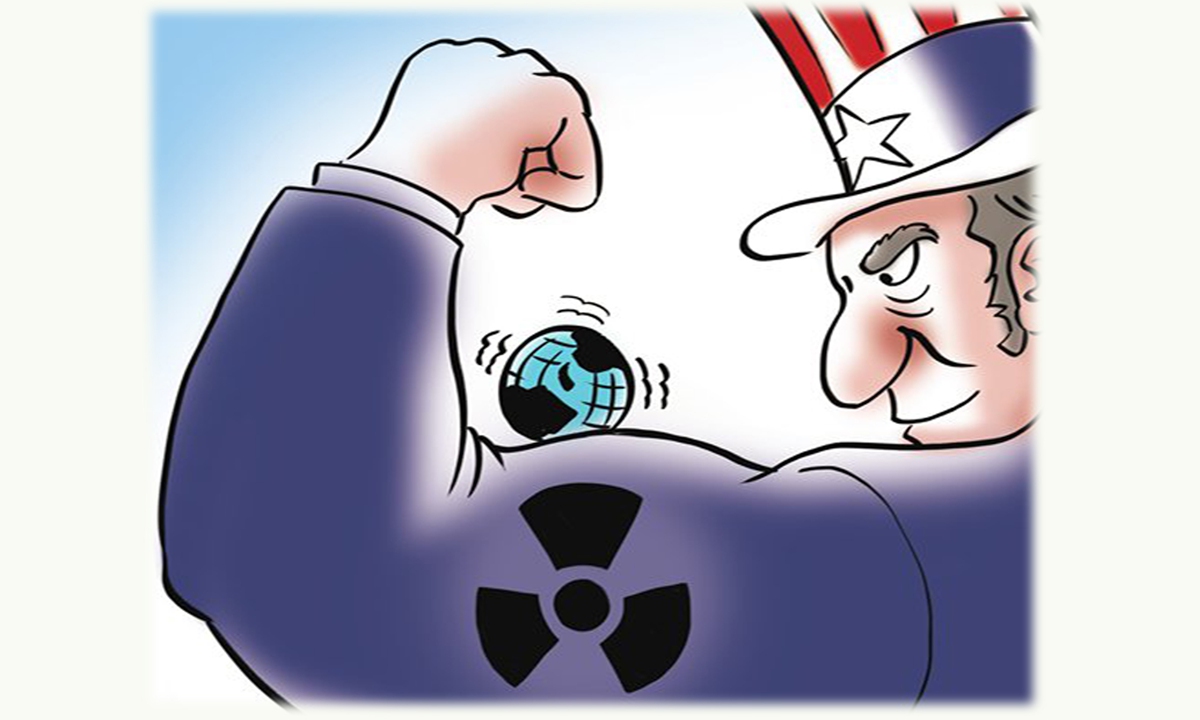A no-first-use policy won't deter US' use of nuclear weaponry to maintain its hegemony

Illustration: Liu Rui/GT
A group of former US' officials, including former defense secretary William Perry, and experts on nuclear disarmament sent an open letter on August 9 asking Japanese political parties not to oppose a "no-first-use" nuclear stance that may be announced by the US, according to Kyoto News.
The US has promised its role as a "nuclear umbrella" for many of its non-nuclear allies including Japan and South Korea. If the US does not reserve the right to use nuclear weapons first, its nuclear umbrella for allies won't exist. The US' consistent nuclear policy is to use nuclear weapons first to safeguard its global hegemony. In general, it will be difficult for Biden to discard this policy.
The US now wants China to join in nuclear arms control talks with the US and Russia. By showing its interests in pursuing a "no-first-use" nuclear stance, the US may want to set a trap to urge China to immediately participate in the nuclear negotiations. In fact, whether the US remains to first use nuclear weapons or not, China will not negotiate the nuclear arms control with the US.
There is an order-of-magnitude difference between the amount of China's nuclear weaponry and that of the US and Russia. China merely has 350 nuclear weapons. But as of March 1, the US had 1,357 warheads on deployed intercontinental ballistic missiles and deployed submarine-launched ballistic missiles, and nuclear warheads counted for deployed heavy bombers, according to figures by the Russian Foreign Ministry. Even if Washington proposes a "no-first-use" nuclear policy, it can also easily abandon it any time. It is only an excuse to serve its political purpose.
In recent years, some in the US have called on the country to adopt no-first-use nuclear strategy. Van Jackson, former strategist and policy adviser in the Office of the US Secretary of Defense is one of them. In July he published an article entitled, "Time for US nuclear strategy to embrace no first use."
But many Americans believe nuclear weapons are the trump card of the US and the US should not abandon its right to use them first. The Biden administration will encounter some resistance to officially announce its "no-first-use" position. The resistance will mainly come from within the country as well as from its allies.
If the Biden administration wants to announce a "no-first-use" policy, it should first get approval in the US Congress. This is because a change of nuclear policy is a crucial consideration which will heavily influence US' overall strategy. The US' conventional forces are not sufficient to support its competition with other great powers. Many political and military elites believe US' biggest advantage lies in its nuclear weaponry. And by adopting "no-first-use" nuclear policy, the US' nuclear deterrence strategy could collapse. This will put the US in a disadvantageous position. Therefore, it remains to be seen whether Congress can pass the potential proposal.
Furthermore, US' allies will put more pressure on the country. As the open letter said, the Obama administration, which had advocated for global nuclear disarmament, abandoned a no-first-use policy in 2016 amid fears that opposition by some allies including Japan may push those allies to develop their own nuclear weapons.
With a no-first-use policy, US' shield for its allies, especially non-nuclear ones, will be heavily reduced. It does not rule out the possibility that these countries may seek to protect themselves by developing their own nuclear weapons. Washington is concerned about this issue. Against this backdrop, the US has to persuade its allies including Japan to accept this proposal.
If the US declares its no-first-use nuclear position, it will heavily reduce its allies' confidence in the US. As a result, the US alliance system will be heavily affected.
But it should be noted that US' intent to use nuclear weaponry to maintain its global hegemony will not change.
The author is a Chinese military expert and commentator. opinion@globaltimes.com.cn
